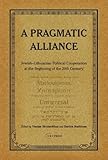A Pragmatic Alliance : Jewish-Lithuanian political cooperation at the beginning of the 20th century / ed. by Darius Staliūnas, Vladas Sirutavicius.
Material type: TextPublisher: Budapest ; New York : Central European University Press, [2022]Copyright date: ©2011Description: 1 online resource (280 p.)Content type:
TextPublisher: Budapest ; New York : Central European University Press, [2022]Copyright date: ©2011Description: 1 online resource (280 p.)Content type: - 9786155053184
- Jews -- History -- 20th century -- Lithuania
- Jews -- Politics and government -- 20th century -- Lithuania
- Jews -- Lithuania -- History -- 20th century
- Jews -- Lithuania -- Politics and government -- 20th century
- HISTORY / Europe / Baltic States
- Antisemitism, Jewish studies, Jews, Lithuania, Russian Empire, Sources, Zionism
- 305.892/40479309041 23
- DS135.L5 P73 2011eb
- online - DeGruyter
| Item type | Current library | Call number | URL | Status | Notes | Barcode | |
|---|---|---|---|---|---|---|---|
 eBook
eBook
|
Biblioteca "Angelicum" Pont. Univ. S.Tommaso d'Aquino Nuvola online | online - DeGruyter (Browse shelf(Opens below)) | Online access | Not for loan (Accesso limitato) | Accesso per gli utenti autorizzati / Access for authorized users | (dgr)9786155053184 |
Frontmatter -- Table of Contents -- Introduction -- Essays -- LITHUANIAN JEWRY AND THE LITHUANIAN NATIONAL MOVEMENT -- COLLABORATION OF LITHUANIANS AND JEWS DURING THE ELECTIONS TO THE FIRST AND THE SECOND DUMAS -- LITHUANIANS IN JEWISH POLITICS OF THE LATE IMPERIAL PERIOD -- LITHUANIA? BUT WHICH? The Changing Political Attitude of the Jewish Political Elite in East Central Europe toward Emerging Lithuania, 1915–1919 -- THE ZIONIST PRIORITIES IN THE STRUGGLE FOR LITE, 1916–1918 -- LITHUANIAN ADMINISTRATION AND THE PARTICIPATION OF JEWS IN THE ELECTIONS TO THE CONSTITUENT SEIMAS -- BETWEEN POLAND AND LITHUANIA: JEWS AND THE VILNIUS QUESTION, 1918–1925 -- Documents from Archives -- THE LITHUANIAN-JEWISH POLITICAL DIALOGUE IN PETROGRAD IN 1917 -- DOCUMENTS ON THE LITHUANIAN COUNCIL OF 1918 IN THE CENTRAL ZIONIST ARCHIVE IN JERUSALEM -- THE LITHUANIAN ZIONIST CONFERENCE, VILNIUS, 5–8 DECEMBER 1918 -- Name Index
restricted access online access with authorization star
http://purl.org/coar/access_right/c_16ec
Discusses the political cooperation between Jews and Lithuanians in the Tsarist Empire from the last decades of the 19th century until the early 1920s. These years saw the transformation of both Jewish and Lithuanian political life. Within the Jewish community, the previously dominant integrationists were now challenged both by those who believed that the Jews were not a religious but an ethnic or proto-nationalist group and those who believed that only with the abolition of capitalism and the establishment of a socialist state would Jewish integration be possible. Among the Lithuanians, the emergence of a modern national identity became increasingly prevalent.
Mode of access: Internet via World Wide Web.
In English.
Description based on online resource; title from PDF title page (publisher's Web site, viewed 29. Jul 2022)


